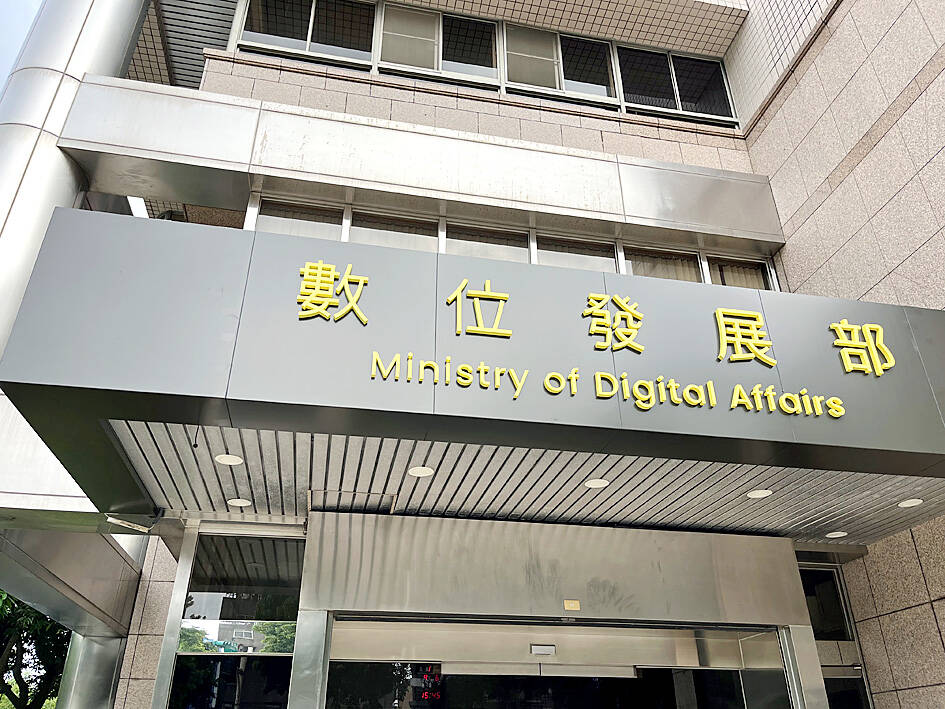The Ministry of Digital Affairs yesterday said that it aims to launch a trial of a digital wallet by the end of this year and that it would accommodate multiple identification documents in one platform.
Aside from banks and insurance firms, the ministry said it hopes that supermarket chain operators could also participate in the trial.
Like a real wallet that a person uses to carry their ID card, National Health Insurance card and other identification documents, the digital wallet would be designed to accommodate multiple cards in one platform, the ministry said.

Photo: Hsu Tzu-ling, Taipei Times
If the digital wallet can be connected to citizen digital certificates and the national health insurance card systems, people could just carry their smartphones when they leave the house, it said.
To win people’s trust in the digital wallet, the ministry would fully disclose the code to the public, Department of Digital Cooperation Director-General Chuang Ying-chih (莊盈志) said.
“This would let the public know two things: first, the operation of the digital wallet does not violate human rights; second, disclosing the program code would allow the public to test and identify problems with the digital wallet and make it safer to use,” Chuang said.
“If hackers can breach the digital wallet, it means the system has problems. Instead of having such problems circulating among hackers, we might as well make the program code public and let everyone have a chance to bolster the safety of the system,” he said.
The types of ID that the digital wallet could carry in the initial phase would probably include citizen digital certificates, business certificates of corporations and certificates of professional skills, Chuang said.
The ministry would try to connect the digital wallet to the systems for driver’s licenses and national health insurance cards, he said.
The digital wallet project has been warmly received by banks and insurance firms, as it would greatly save the time and resources they spend in verifying the identities of their customers, Chuang said.
The system would also help people when they pick up items purchased online at convenience stores, he said.
“Consumers need to present their ID cards. To accumulate points in their membership accounts, they need to give their phone number and must verify it on screen. This could lead to leaks of personal data. We will try to allow consumers to use the digital wallet in convenience stores,” he said.
The digital wallet is to be tested in a sandbox in next month and a trial version is expected to be launched in December, the ministry said.

‘FORM OF PROTEST’: The German Institute Taipei said it was ‘shocked’ to see Nazi symbolism used in connection with political aims as it condemned the incident Sung Chien-liang (宋建樑), who led efforts to recall Democratic Progressive Party (DPP) Legislator Lee Kun-cheng (李坤城), was released on bail of NT$80,000 yesterday amid an outcry over a Nazi armband he wore to questioning the night before. Sung arrived at the New Taipei City District Prosecutors’ Office for questioning in a recall petition forgery case on Tuesday night wearing a red armband bearing a swastika, carrying a copy of Adolf Hitler’s Mein Kampf and giving a Nazi salute. Sung left the building at 1:15am without the armband and apparently covering the book with a coat. This is a serious international scandal and Chinese

SECURITY: As China is ‘reshaping’ Hong Kong’s population, Taiwan must raise the eligibility threshold for applications from Hong Kongers, Chiu Chui-cheng said When Hong Kong and Macau citizens apply for residency in Taiwan, it would be under a new category that includes a “national security observation period,” Mainland Affairs Council (MAC) Minister Chiu Chui-cheng (邱垂正) said yesterday. President William Lai (賴清德) on March 13 announced 17 strategies to counter China’s aggression toward Taiwan, including incorporating national security considerations into the review process for residency applications from Hong Kong and Macau citizens. The situation in Hong Kong is constantly changing, Chiu said to media yesterday on the sidelines of the Taipei Technology Run hosted by the Taipei Neihu Technology Park Development Association. With

A US Marine Corps regiment equipped with Naval Strike Missiles (NSM) is set to participate in the upcoming Balikatan 25 exercise in the Luzon Strait, marking the system’s first-ever deployment in the Philippines. US and Philippine officials have separately confirmed that the Navy Marine Expeditionary Ship Interdiction System (NMESIS) — the mobile launch platform for the Naval Strike Missile — would take part in the joint exercise. The missiles are being deployed to “a strategic first island chain chokepoint” in the waters between Taiwan proper and the Philippines, US-based Naval News reported. “The Luzon Strait and Bashi Channel represent a critical access

COUNTERINTELLIGENCE TRAINING: The ministry said 87.5 percent of the apprehended Chinese agents were reported by service members they tried to lure into becoming spies Taiwanese organized crime, illegal money lenders, temples and civic groups are complicit in Beijing’s infiltration of the armed forces, the Ministry of National Defense (MND) said in a report yesterday. Retired service members who had been turned to Beijing’s cause mainly relied on those channels to infiltrate the Taiwanese military, according to the report to be submitted to lawmakers ahead of tomorrow’s hearing on Chinese espionage in the military. Chinese intelligence typically used blackmail, Internet-based communications, bribery or debts to loan sharks to leverage active service personnel to do its bidding, it said. China’s main goals are to collect intelligence, and develop a